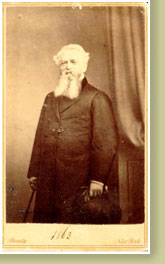A bill passed both houses of the New York State legislature authorizing the expenditure of the Literature Fund and was approved on May 7, 1847 to establish a free academy in the city of New-York, an occasion celebrated at City College beginning in 1905 as Charter Day. The voters of New York considered the referendum in the Judicial and School Elections held on June 7, 1847, and passed it by a vote of 19,305 in favor and 3,409 against. The Commissioners of Common Schools, constituting a Board of Education for the City and County of New York, convened on June 16, 1847, to formalize the creation of the Free Academy, the original name of The City College of New York. Architect James Renwick (1818-1895) was hired to design the building to house this new academy on a lot at the corner of Lexington Avenue and 23rd Street. The entrance examination was administered to the first group of young men who entered the institution in January 1849, and Townsend Harris attended the opening ceremony.
The new institution generated controversy during its first decade. Horace Greeley, (1811-1872), the founder and editor of The New Tribune, and member of the New York City Board of Education from 1849 to 1850, argued against the expenditure of funds for the education of young men in the Annual Report of May 15, 1850:
I distrust and challenge the policy of giving a part of the children of our City a far more costly education, at the public expense, than is provided for and freely proffered to all children, without reserve or exception Apart from any such compact, I deny the right of a community to give a superior education to its most intellectual and cultivated youth. The profound truth divinely announced, that To him that hath shall be given, while from him that hath not shall be taken even that he hath, has abundant scope and power in our existing society, and needs no novel and extraordinary agencies invoked to render its operation more sweeping and universal. If it be proper for our



